- Details
-
Published: Thursday, 09 August 2012 17:22
The Salvadoran Government Proposes Suspending Mining in El Salvador
On August 7th, the Ministry of the Environment (MARN) and the Ministry of the Economy (MINEC) presented a bill to the Legislative Assembly that would temporary suspend all mining activity in El Salvador. The bill states that there are not the necessary conditions for mining in El Salvador.  If passed, the suspension would nullify all current mining permits, block the application for future permits and retroactively suspend all past permits.  The bill references the Strategic Environmental Assessment, which was finally released at around the same time as the bill, as the basis for decision to suspend mining.
It is important to note that this bill is not the mining ban presented to the Legislative Assembly in 2005 by the National Roundtable against Metallic Mining (the Mesa in Spanish).   The Minister of the Economy was citied a number of times in the press saying this would not mean a permanent ban on mining in the future.  After reading through the bill it becomes clear that it no way guarantees there will not be mining in El Salvador, but instead identifies nine conditions that need to be met in order for mining to proceeding in the country. Among others, these conditions include gathering more scientific information about mining and its effects on the environment and water, strengthening the government institutions that would oversee mining activity, as well as the adequate closure of old mines and compensation for communities affected by past mining.
The bill establishes a committee of ten people appointed by the Technical Secretariat of the President’s Office which will be charged with monitoring the advances regarding the established conditions and eventually recommending that the suspension be lifted.  Besides representatives of government institutions, this committee will include two “international experts,” two mining industry representatives and two representatives of civil society.
Below is the press statement from the Mesa regarding the proposed bill, but a few of the main reflections and critiques from El Salvador are:
1. The Funes government is fulfilling its promise to not allow mining, while simultaneously shifting the responsibility to the next administration in terms of making the final decision on the issue. After looking at the time frame established by the bill, it becomes clear that any analysis and decisions made regarding mining will happen after the 2014 elections.
2. The logic of the bill is flawed. If the conditions to ban mining are not present and environmental degradation and water scarcity are going from bad to worse in El Salvador, why not definitively take the necessary measures to assure the protection of water and natural resources in the future? Why establish conditions that seem difficult to meet instead of just banning mining?
3. The institutional weakness in El Salvador makes this bill extremely risky. The nine vague conditions laid out in the bill, as well as the fact that the President’s Office appoints the members of the committee that will make the proposal to revoke the suspension, means that if a pro-mining government were elected 2, 6, or 10 years from now, it would be relatively easy for them to claim the conditions have been met and stack the committee in their favor, essentially opening the door to mining, against the wishes of the communities and the general population.   It is not unreasonable to think this could happen. Examples of policies being implemented that lack the necessary conditions to protect the population from their negative effects are a dime a dozen: privatization of public services, dollarization, the Central American Free Trade Agreement, etc.Â
4. If a bill were passed to ban mining it would need the votes of at least half the Legislative Assembly to be overturned, however with this bill seven people (of the committee of ten) can essentially decide to allow mining.
5. Passing this bill without changing or modifying Salvadoran Investment law will open the door to more law suits by international mining companies.
Â
 The National Roundtable against Metallic Mining States that the Law Proposed by the Government to Suspend Metallic Mining Activity is a False Solution and Calls on the Legislative Assembly to Definitively Ban Mining
In response to the proposed Special Law for the Suspension of Metallic Mining Exploration and Exploitation Projects Proceedings presented by the Salvadoran Government to the Legislative Assembly, we announce to the Salvadoran population and the international community that:
The suspension of metallic mining exploration and exploitation projects proposed by the Ministries of the Economy and Environment, does not eliminate the threat metallic mining poses to the country, it only postpones it. The bill, in its very nature, is temporary, superficial and does not contain any scientific basis. It shows that the government is not interested in banning metallic mining, even when we have scientifically demonstrated with technical arguments that metal extraction from Salvadoran soil is irrational because it would contaminate and destroy the environment, break down the social fabric in communities, as well as violate the fundamental rights of the population.
We reiterate that the serious environmental degradation our country suffers is incompatible with such a predatory industry, like that of metallic mining. The grave contamination that has affected 98% of our rivers, the chronic scarcity of potable water that population faces, as well as the fact that El Salvador is one of the most deforested and densely populated countries in Latin America and one of the most vulnerable countries in the world, where 98% of the population lives in areas prone to natural disasters, should all be reason enough to close the doors on mining companies in El Salvador.
As the National Roundtable against Metallic Mining we consider the proposed Law to Suspend Mining presented by the government a demagogic and false solution to the threats posed by vicious transnational companies from the extractive industry. If the Funes government really cares about guaranteeing sustainability and improving the quality of life of the population, instead of looking for a superficial solution that has been designed to save the administration itself, they should promote a ban on metallic mining through a new Mining Law that explicitly reflects the profound socio-environmental crisis we are suffering which is currently rapidly deepening. Â
Among other inconsistencies, we would like to point out that the proposal of creating a Follow-up Committee that will monitor the supposed “Institutional Strengthening Plan” and will judge when the suspension should be lifted, poses a threat to the Salvadoran population and particularly the communities that have been affected by mining projects. We denounce the fact that the decision to ban or allow mining falls on the shoulders of a small group of people. This should be a sovereign decision of the Salvadoran people that, according to the Constitutional values and International Law rhetorically referenced in the Suspension Law itself, that should be made by Salvadoran people together and not by a few businessmen and appointees named by the government in office at the time.
Government institutions have historically succumbed to the special interests of big business, whose only goal is to pillage our natural resources.   This has been clearly shown by the destruction that metallic mining has caused in the San Sebastian River in the department of La Union and by the terrible lead pollution in the town of Sitio del Niño in La Libertad. This proves that the rules of the game, and the infamous institionality, tend to favor companies and that good intentions don’t really protect the majority of people and don’t promote dignified living conditions nor sustainability for the country.
For the reasons expressed above, we urge the Legislative Assembly not to be convinced by false solutions. Â Instead of spending time discussing the temporary suspension of metallic mining presented by President Funes, they should read, discuss, and pass as soon as possible the Law to Ban Metallic Mining which was presented by the National Roundtable against Metallic Mining in 2006.
We reject dangerous and false solutions!
We demand the immediate approval for a law that definitively bans metallic mining in El Salvador!
For a copy of the press release in Spanish see here.
For press coverage in Spanish of the government’s bill see La Prensa Graficia here, here and here; El Diario de Hoy here and here; Contrapunto, the Diario CoLatino, and La Pagina.Â
For press coverage of the Mesa’s response see the Diario CoLatino.
For a copy of the bill in Spanish see here.
 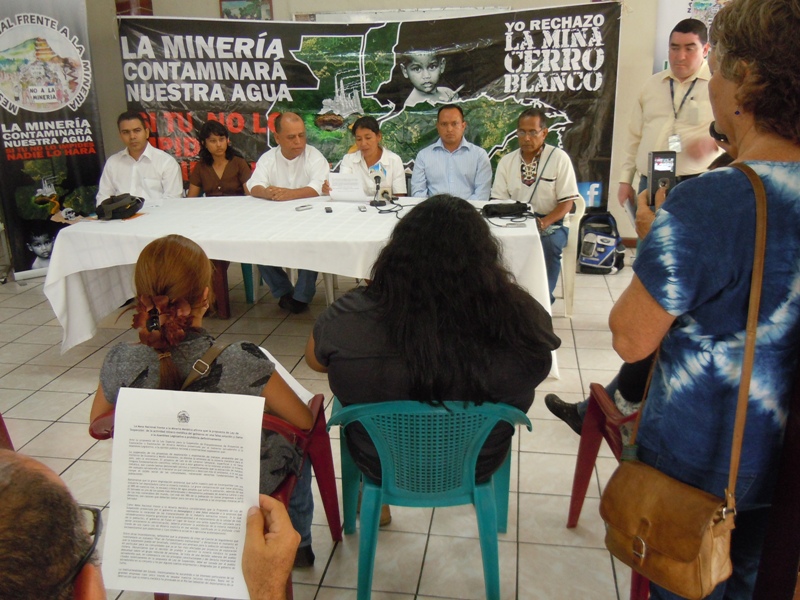
- Details
-
Published: Wednesday, 18 July 2012 08:26
Mining Ambition Impedes Environmental Justice
The National Roundtable against Metallic Mining and environmental organizations consider that by allowing mining in El Salvador, the repercussions for the environment would exceed the multi-million debt that the country currently faces in the lawsuit filed by Pacific Rim.
By Ivannia Serrano
Translated by Jan Morrill
Original in Spanish
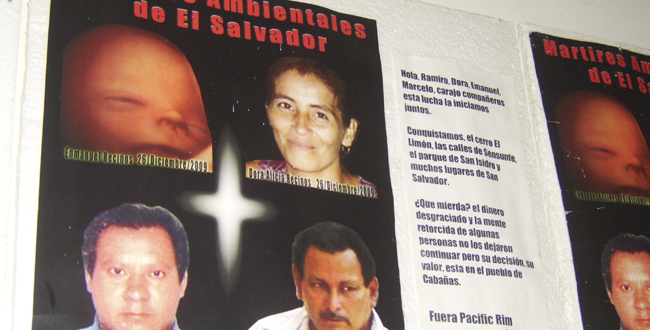
The last UN UNDAC (United Nations Disaster Assessment and Coordination Office) report in 2011 revealed that El Salvador is among the top ten most vulnerable countries in the world. There has been a 30% loss of bio-diversity; it’s the most deforested country in American Continent after Haiti. It also has the least access to water in the Central American Region.
Luis Gonzalez, from the Climate and Energy Division of the UNES, says “we have water access of between 1700 and 1800 m³, when the Central American average is 10,000 m³. That means that we are below average.”
He adds that El Salvador has had a drop in water levels in its rivers over the last fifty years, except for the Acelhuate River, which has had an increased flow because it transports 600 tons of feces daily.  Along these lines, there are water level studies that indicate that the majority of rivers will disappear been 1,600 and 1,200 years from now, and in the case of the Lempa River, the most strategic water resource in the country, between100 and 160 years.
Studies by the Ministry of the Environment and Natural Resources (MARN) show that only 2% of the water in the country is in “good” quality category.
With respect to this situation, Gonzalez claims that mining is not feasible in El Salvador, because one of the main impacts on a national level that could be created by mining would be on the water.
According to technical and scientific studies the gold particles found in El Salvador are scattered in the soil, and in many cases are microscopic. For this reason, the only economically feasible method for extracting this gold from the rock is through leaching, a physiochemical process in which gold is separated from rock by adding cyanide.
A specialist in climate and energy, Luis Gonzalez, explained that the use of cyanide is very harmful. “Cyanide is a very toxic chemical, to the point where the amount of cyanide equivalent to a grain of rice can kill an adult human being. Also, the heavy metals released could be arsenic, selenium, and lead which are also pollutants and can be toxic.”
 According to research done by the UNES, each mining project would use 40 tons of cyanide a day. This, like many heavy metals, is a bioaccumulator, which means that if it is not absorbed by the environment little by little it can accumulate in the soft tissues of human beings. Consequentially, it causes degeneration at the cellular level and is the root of a number of illnesses like kidney disease, migraines, impotency, infertility, fetal damage, etc.
According to research done by the UNES, each mining project would use 40 tons of cyanide a day. This, like many heavy metals, is a bioaccumulator, which means that if it is not absorbed by the environment little by little it can accumulate in the soft tissues of human beings. Consequentially, it causes degeneration at the cellular level and is the root of a number of illnesses like kidney disease, migraines, impotency, infertility, fetal damage, etc.
Most of the gold mining companies in the world are Canadian. In El Salvador, Pacific Rim has been at the forefront. Many other companies, like Minerales Morazan, are also subsidiaries of Pacific Rim. However, Gonzalez said “it’s a junior firm, which specializes, more than anything, in exploration and when the exploration is finished they sell the project to a larger company.”
Currently, Pacific Rim has an exploration permit. However, in response to government opposition, which has not given a the company mining exploitation permit, the company has filed a $120 million lawsuit against the country in the International Center for the Settlement of Investment Disputes ICSID, arguing profit expropriation.
To date, the process remains open, and a law that bans mining is the only way to avoid the actions taken by mining companies and possible suits against the government. According to Gonzalez, as long as the process continues, Pacific Rim can increase the amount of the suit by arguing they are incurring procedural costs. Also, this forces the Salvadoran Government to pay huge amounts of money to the international lawyers that are defending their case. According to studies done by FESPAD there have been more than $5 million spent already.
However, for the UNES representative, Pacific Rim has acted in the same way as mining companies throughout the world. “They arrive in a community and begin to buy people off, to sponsor the patron saint festivals for the mayor’s office, school uniforms for the children, the give out some bags, medical or eye campaigns, and obviously they create the false promise of some type of employment, and what all this has caused in the department of Cabañas, one of the areas most affected by metallic mining, is that there are divisions in way people think.”
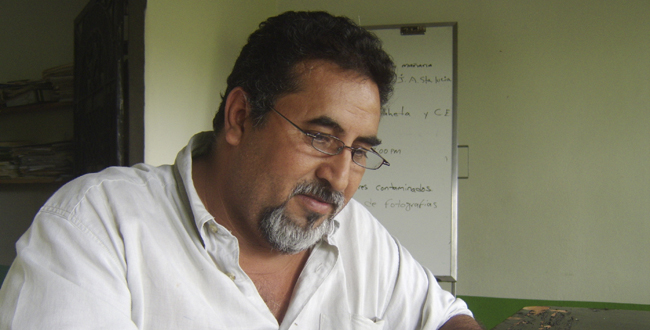 This idea is shared by Francisco Pineda, founder and president of the Environmental Committee of Llano de la Hacienda en Cabañas, who testifies that the deaths of five environmentalists in the area are the result of opposition by the population to mining at the “El Dorado” mine.
This idea is shared by Francisco Pineda, founder and president of the Environmental Committee of Llano de la Hacienda en Cabañas, who testifies that the deaths of five environmentalists in the area are the result of opposition by the population to mining at the “El Dorado” mine.
“The threats began when the communities became organized and to carry out direct action. Because of this, the company feels its investments are being threatened and it sued the government at the ICSID and that is when we began to receive more threats,” said Francisco.
Among the environmental leaders who were murdered, Dora Alicia Recinos stands out. She was 32 years old, a member of the Environmental Committee of Cabañas, and was 8 months pregnant when she died.
Juan Francisco Duran Ayala was most recent murder on June 24, 2011. Pineda describes him as a young man who studied foreign languages, and who could have helped with translating documents, because he was skilled.  After his disappearance, he was found dead in Lamatepec with a gunshot wound to his head.
“To date we have not seen any investigations that clarify the facts in this case, and in the other cases, they say it was because of personal feuds,” says Pineda, who in 2011 received the Goldman Prize, one of the most recognized prizes on an international level, for his struggle against mining company Pacific Rim.
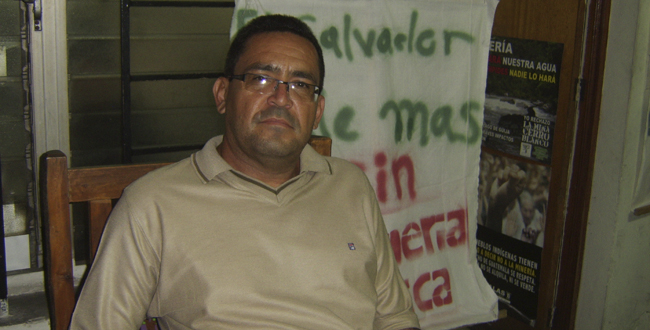 From his point of view, Pineda considers that a year after Juan Francisco´s the death, the Attorney General’s office has not been effective and its investigations it clings to its hypothesis and ignore the hypothesis that the population has proposed.
From his point of view, Pineda considers that a year after Juan Francisco´s the death, the Attorney General’s office has not been effective and its investigations it clings to its hypothesis and ignore the hypothesis that the population has proposed.
In this sense, he considers that his hypothesis should be taken into account and that not only should mining company representatives be investigated, but also legislative representatives, “there were close ties with mining companies during the elections. We believe that Pacific Rim has helped finance part of the political campaigns and that is why there is an agreement between them.”
In response to the issue, the mayor of San Isidro, José Bautista warns that the Legislative Assembly or the President of the Republic have the last word on whether mining will be approved or not. Also, he is close-lipped about the murders in his department.
Francisco Pineda, who has lost count of how many threats he has received in spite of protection given to him by the government, will not stop in the struggle to defend his land, the community and the country.Â
As part of the actions taken to defend natural resources in the country, the National Roundtable against Metallic Mining, presented an alternate document to the ICSID called an “Amicus Curiae” or Friend of the Tribunal. The idea in this process, according to Rodolfo Calles, the Roundtable facilitator, is “to present a number of arguments of why mining isn’t feasible in El Salvador to better illustrate our position against mining for the judges.”
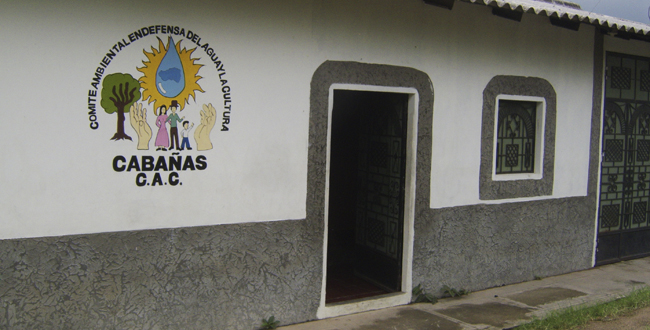 To date, there has not been a response from the ICSID. For Rodolfo, this is because the majority of the arguments they presented are about human rights and the environment, which don’t represent weighty argument for this regulatory institution, because it is a predominantly trade-focused organization.
To date, there has not been a response from the ICSID. For Rodolfo, this is because the majority of the arguments they presented are about human rights and the environment, which don’t represent weighty argument for this regulatory institution, because it is a predominantly trade-focused organization.
Even so, the Roundtable is committed to continuing to provide support for the legal issues, and to continuing to provide proof and testimony of how mining affects the country. These efforts have been supported by international allies from the U.S. and Canada, including information campaigns to raise awareness in the public and to pressure Pacific Rim to drop their suit against the government.
Currently there are 25 exploration permit applications and 29 mining exploration concessions for gold and silver, which could in turn become 25 new law suits for the country, because there is still a national legal framework that does not ban mining as such.
For this reason, the National Roundtable proposes a law that would ban metallic mining. In the first place, to avoid more deaths in Cabañas because as long as there is a possibility for mining there will be opposition and violence. Secondly, to eliminate the threat of environmental degradation.Â
“Even if we loose the suit, it’s preferable to pay the 100 or 200 million, instead of allowing mining in El Salvador, because the environmental costs are much more than the amount of the suit” he claimed.Â
- Details
-
Published: Wednesday, 23 May 2012 23:59
The National Roundtable against Metallic Mining demands information and an honest debate about the future of metallic mining in El Salvador
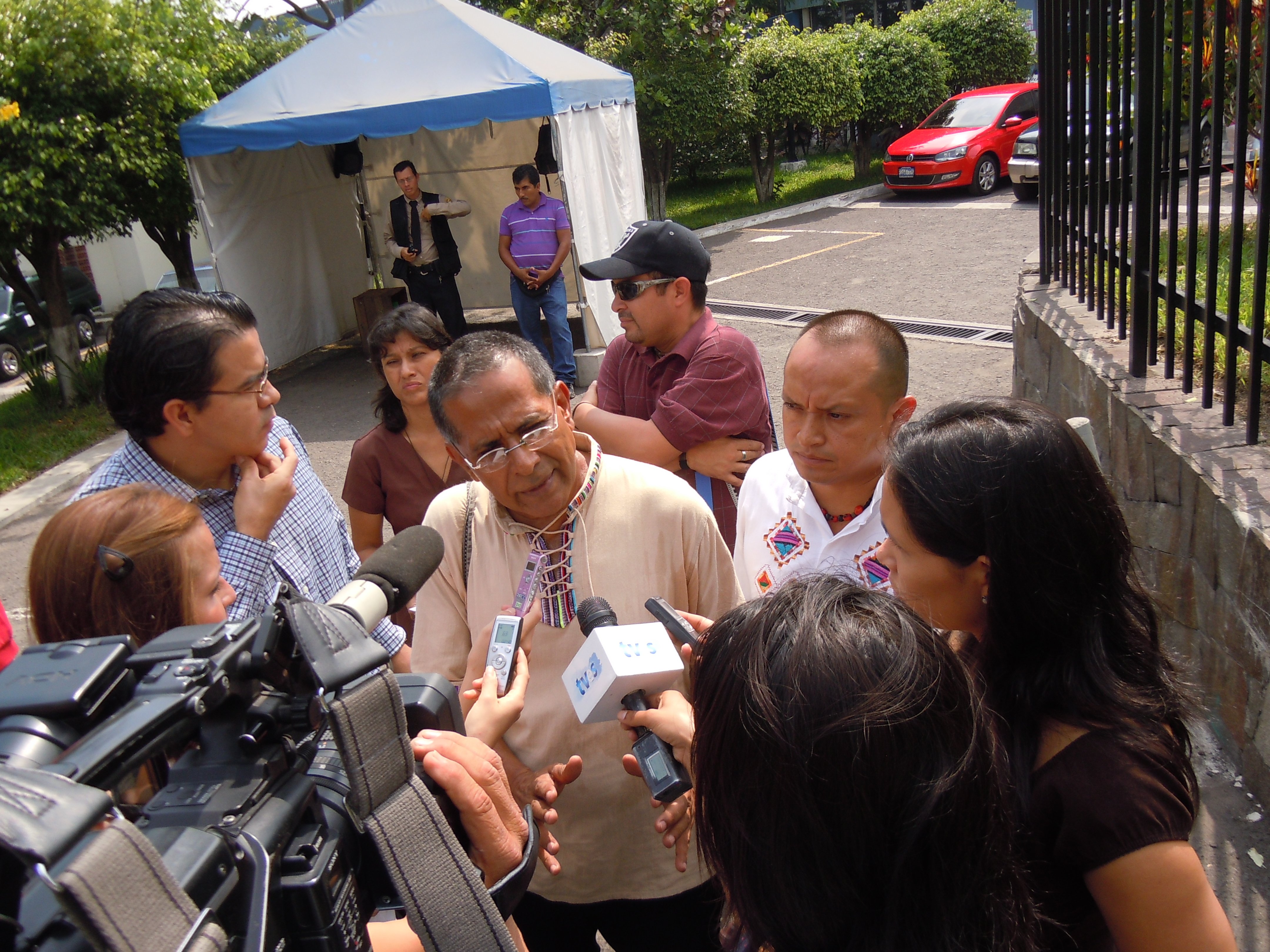
The National Roundtable against Metallic Mining (the Mesa in Spanish) asks the Salvadoran Government for all public information related to mining companies that have applied for operations permits in El Salvador, how far they have advanced in the application process, as well as the names of the applicants and their legal representatives.
The request for public information is based in the recently enacted Access to Public Information Law (LAIP in Spanish) and is a call to the government to present transparent information. This information is currently being manipulated in a way that lacks transparency and is behind the back of the population.
The National Roundtable against Metallic Mining criticizes the ambiguous and non-transparent way officials from the Ministries of the Environment and the Economy have dealt with the issue, especially with respect to the completion of the Strategic Environmental Assessment (SEA) of the mining sector.
After almost a year of setbacks and then silence from the authorizes that forced, last March, the National Roundtable against Metallic Mining to leak a draft of the SEA to the press, Lina Pohl, the Vice minister of the Environment, stated that the only possible scenarios related to mining are the suspension of mining permits or not-issuing new licenses.Â
For  the Mesa, this stance is insufficient and reinforces its belief that the results of the SEA don’t deal with the mining problem in an integral way and are, actually, an investigation into the feasibility of mining which would favor large multi-national corporations.  The Government should be proactive in defending Salvadorans lives and should energetically promote a definitive ban on metallic mineral mining in the country. There are not the environmental conditions necessary to support this industry, and therefore, the government should take clear and resounding actions to ban it. A moratorium only allows for more mining companies to continue to buy officials off and trick to the people with small donations that don’t resolve the structural problems of poverty and social exclusion.
The Mesa calls on the Legislative Assembly to begin the discussion of the proposal for a lw to Ban Metallic Mining which is stuck in commission. President Funes, on his part, should demonstrate his commitment to not allow mining projects by supporting a metallic mining ban.
NO TO METALLIC MINING PROJECTS. NO TO A EXPLOITATION PERMITS MORATORIUM.  WE DEMAND THAT METALLIC MINING IS BANNED IN EL SALVADOR.
National Roundtable against Metallic Mining in El Salvador
San Salvador, May 23, 2012
- Details
-
Published: Thursday, 10 May 2012 14:17
“It wasn’t the Attorney General’s Office that harassed me, it was the DECO”
Zoraya Urbina
Editorials, Diario Co Latino
The original in Spanish
Santos Rivera, brother to Ramiro, the environmentalist murdered in 2009 in Cabañas, explained that when he gave testimony against those accused for the crime, he was harassed by the investigators from the DECO (the Elite Division against Organized Crime) and not by the Attorney General’s Office, as was reported in a story published on April 16th. Recently, the Specialized Sentencing Court of San Salvador sentenced those accused for the murders of five environmentalists in the Town of Trinidad, Sensuntepeque, Cabañas, among them Santos’s brother and Dora Alicia Sorto, who was eight months pregnant. In response, the Environmental Committee of Cabañas (CAC) expressed its dismay with the ruling of the Court, a position that Santos Rivera shares.
“As an environmentalist and as a brother I am not satisfied with the actions of the Attorney General’s Office, how they investigated the cases, and the ruling of the Specialized Sentencing Court, because there are people who have participated as much as those found guilty who have been set free, and the intellectual authors are free as well and there have not been efforts to get to the bottom of the case.”
Santos said that he believes that the authorities already knew who the intellectual authors were, but they were no interested in investigating and it was possible that the company Pacific Rim was manipulating the disposition to investigate.
Francisco Pineda, the president of the CAC, has said on repeated occasions that the Attorney General’s Office is wrong in stating that family disputes provoked the crimes, due to the fact that before the arrival of mining companies in Cabañas there were differences among families but they never reached the point of murders being committed.
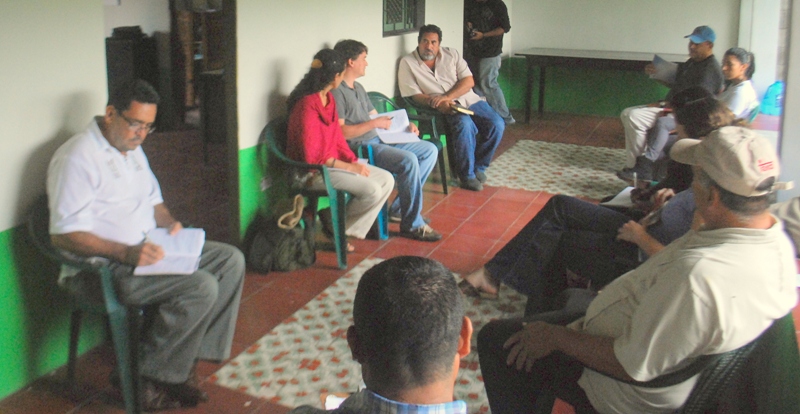



 According to research done by the UNES, each mining project would use 40 tons of cyanide a day.
According to research done by the UNES, each mining project would use 40 tons of cyanide a day. This idea is shared by Francisco Pineda, founder and president of the Environmental Committee of Llano de la Hacienda en Cabañas, who testifies that the deaths of five environmentalists in the area are the result of opposition by the population to mining at the “El Dorado” mine.
This idea is shared by Francisco Pineda, founder and president of the Environmental Committee of Llano de la Hacienda en Cabañas, who testifies that the deaths of five environmentalists in the area are the result of opposition by the population to mining at the “El Dorado” mine. From his point of view, Pineda considers that a year after Juan Francisco´s the death, the Attorney General’s office has not been effective and its investigations it clings to its hypothesis and ignore the hypothesis that the population has proposed.
From his point of view, Pineda considers that a year after Juan Francisco´s the death, the Attorney General’s office has not been effective and its investigations it clings to its hypothesis and ignore the hypothesis that the population has proposed. To date, there has not been a response from the ICSID.
To date, there has not been a response from the ICSID.
